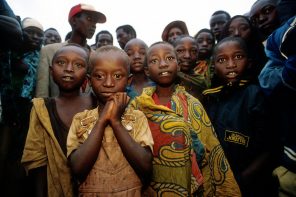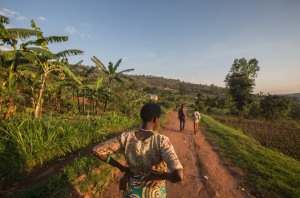Today is the 14th anniversary of the genocide. I’m used to genocide anniversaries. I spent 8 years organizing Holocaust memorials in my home town and on my undergraduate campus, and I tried to get a Rwandan genocide memorial going at SIPA, though it never took off.
Which is to say, I mark genocide anniversaries by planning things. Finding rooms, a guest speaker, an A/V system… I bury myself in logistics, and then I mark the moment. It means nothing, in the scheme of Real Things in the World, but it has always meant something to me.
So I didn’t think twice about going to the genocide memorial service here in Kigali. The city program was at the museum in Gisozi, and a roommate and I headed over there this morning. I should have realized this was going to be a different experience after the first half hour, which we spent just watching folks take coffins, draped in white and purple, out of trucks. I should have realized this was going to be different as we stood waiting for the program to start, and I noticed folks walking around in white vests that said “Trauma Counselor.”
But there’s this strange thing, this difference between what you know in your head and what you feel. I knew I was in the place where genocide happened, commemorating it among people who had lived through it. I know what that means, intellectually, but what does it mean as a human experience? What does it feel like?
I looked around. Every single place that could be taken by a human being, was. People sat on the decorative edge of the building; in the grass in the gardens; on each other’s laps. I tried to do a quick crowd estimate; there can’t have been less than 5,000 people there. Most of them wore purple scarves tied around their necks or around their arms–purple is the color of genocide remembrance, but enough people didn’t wear them that I wondered whether it is a thing only survivors do. Everyone was dressed in their nicest clothes–some women, in those beautiful Rwandan dresses that swoop up at the shoulder, others in bou bous, others still in colorful prints; many men wore suit jackets and ties, even though the sun blazed. Others had come in a clean t-shirt, pressed pants, their plastic yellow shoes–their nicest clothes, you got the feeling, even though they might not stand up next to some of the more elegant robes.
I don’t know who walked past me, or what I heard, but suddenly I felt, in a lived way, that thing which is an obvious idea: that every person here has a story about this day 14 years ago. I felt small and weak and overrun by the weight of history that isn’t mine. I wanted to cry, but I felt out of place, too disconnected for my crying to seem to me anything more than a strange voyeurism.
This feeling only got worse as the program continued. When the first survivor started giving a testimony–I could understand enough key words to figure out that was happening, even though I had no real idea what she was saying–a woman let out a piercing wail. She shrieked and cried, and she was carried away. And then, the next woman cried. And the next. At the beginning it was all women, but then men, too were carried away, crying, shrieking, or simply in faint. The Red Cross would take one arm–unless, like one young woman who just beamed strength, the person pushed the Red Cross away–and a friend would take the other, and they would walk, slowly, to the back of the compound. Someone would follow with the person’s water, or purse, or shoes.
Near where they were moving people, my eyes caught one young man, maybe 25. He was sitting, with many others, beneath the balcony of the museum building. He wore purple on his wrist; he leaned his head against the bicep of the man next to him, and he rested his hand on his temple, as if he were trying to feel held. His eyes were red and wet: He had been crying, or might yet cry, or both. For some reason, we looked at each other for a long, long minute. I appreciated his stare, because it made me feel connected, somehow. I have no idea what he thought, and aware that I was a guest here, in every sense of the world, I looked away to cry.
Soon enough, just behind us, a chorus of wails and cries rose up. At the same time, the program went on. Between the fact that I couldn’t understand the program, and the fact that it continued over such audible pain, the whole place became uncomfortably dissonant. My instinct was to concentrate on the talking, even though I couldn’t understand it, and block out the cries.
But that seemed callous, wrong. These people were communicating a kind of pain that knows no words, and I felt like I needed to listen. I had come here, to Gisozi, to this country, because I wanted to learn how to listen. So I shut my eyes and tried to hear it, to be with it, even though there was nothing I could do, or even understand.
I wondered if this is what the streets of Kigali sounded like 14 years ago. I wondered if these men and women were reliving their trauma, or if they were remembering, or if there really is a difference. I wondered if they would ever be able to leave, or ever want to.
But eventually, I wondered what I was doing in this place, where so many had gathered for something that had become so quickly intimate, something which I was not a part of, and which I did not understand, linguistically or cognitively or emotionally. I felt helpless and stupid and, suddenly, ill. I decided I had to leave.




Thank you for this. Much the way I felt last month at Auschwitz…except there was no room of survivors. Only empty space and tourists, school children moved en masse through history and a memory which is slowly dying out; only found in books and empty train tracks with no survivor to tell the story.
Thanks, Matt. That’s a really fascinating observation. The two times I was at Auschwitz, I felt what you describe—this eerily empty but incredibly compelling space, surrounded by tour buses. We also saw a picnic in front of Birkenau. I wonder now whether it’s as shameful as I thought at the time, tsk-tsking, or if it’s a sign of some amount of normalcy in dealing with such heavy history that might actually be ok.
Matt forwarded me the link to your blog. Thank you so much for sharing your experiences and insights in Rwanda, Jina, and please continue to do so!
Best wishes,
Zach
Jina, thank you for coming to share in the commemoration at our Centre. Your writing is very much appreciated. Steve
Jina your story is quite touching. Been checkin out your writing style and I mustsay it feels like Kapuscinski (that’s a compliment).
I am a Ugandan Writer based in rwanda and it always feels like that way. I am now In Uganda buthope to return by Friday.
I hope we meet sometime to share experiences. Here is a story I wrote aboutgenocide for Uganda’s Weekly Observer paper http://www.ugandaobserver.com/new/features/spec/spec200804101.php
See you soon